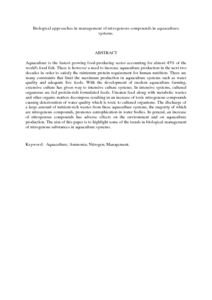Citation
Md. Yusoff, Fatimah and Mohamed Din , Mohamed Shariff and Banerjee, Sanjoy and Khatoon, Helena
(2011)
Biological approaches in management of nitrogenous compounds in aquaculture systems.
Dynamic Biochemistry, Process Biotechnology and Molecular Biology, 5 (1).
pp. 21-31.
ISSN 1749-0626
Abstract
Aquaculture is the fastest growing food-producing sector accounting for almost 43% of the world's food fish. There is however a need to increase aquaculture production in the next two decades in order to satisfy the minimum protein requirement for human nutrition. There are many constraints that limit the maximum production in aquaculture systems such as water quality and adequate live feeds. With the development of modern aquaculture farming, extensive culture has given way to intensive culture systems. In intensive systems, cultured organisms are fed protein-rich formulated feeds. Uneaten feed along with metabolic wastes and other organic matters decompose resulting in an increase of toxic nitrogenous compounds causing deterioration of water quality which is toxic to cultured organisms. The discharge of a large amount of nutrient-rich wastes from these aquaculture systems, the majority of which are nitrogenous compounds, promotes eutrophication in water bodies. In general, an increase of nitrogenous compounds has adverse effects on the environment and on aquaculture production. The aim of this paper is to highlight some of the trends in biological management of nitrogenous substances in aquaculture systems.
Download File
![[img]](http://psasir.upm.edu.my/25191/1.hassmallThumbnailVersion/Biological%20approaches%20in%20management%20of%20nitrogenous%20compounds%20in%20aquaculture%20systems.pdf)  Preview |
|
PDF (Abstract)
Biological approaches in management of nitrogenous compounds in aquaculture systems.pdf
Download (83kB)
| Preview
|
|
Additional Metadata
Actions (login required)
 |
View Item |

